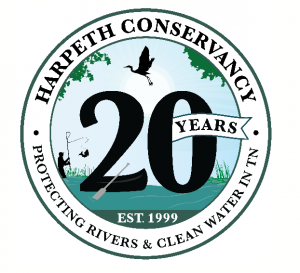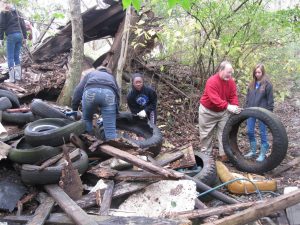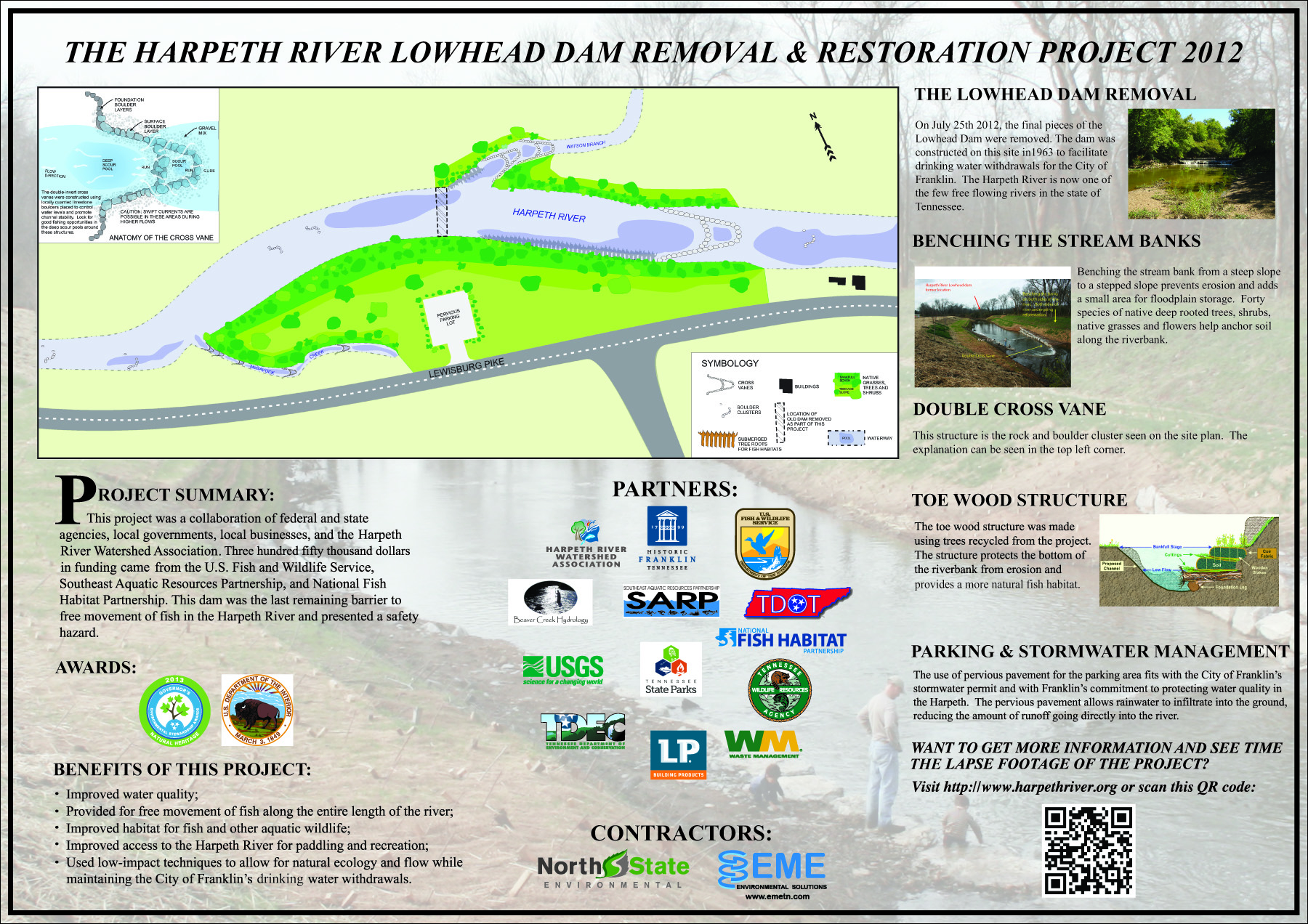Harpeth Conservancy celebrates 20 years of real, measurable accomplishments!
 Since its foundation in 1999, Harpeth Conservancy has worked to restore and protect clean water and healthy ecosystems for rivers in Tennessee. Below are some of the highlights of our work over the years. Click here for our 20 Year Highlights.
Since its foundation in 1999, Harpeth Conservancy has worked to restore and protect clean water and healthy ecosystems for rivers in Tennessee. Below are some of the highlights of our work over the years. Click here for our 20 Year Highlights.
Shortly after our founding, we did the earliest complete visual assessment of river conditions with a grant we obtained from the USDA.
We initiated a River Restoration Program with a $50,000 grant from the Tennessee Department of Agriculture’s Nonpoint Source program.
That same year, we also did the first sediment/Dissolved Oxygen study of river.
Harpeth Conservancy received a unique $200,000, three-year grant from the USEPA to create a coalition of stakeholders to improve water quality in the watershed.
The City of Franklin’s Board of Mayor and Aldermen recognized Harpeth Conservancy’s expertise in a resolution seeking to integrate our expertise into City projects.
With funding from the World Wildlife Fund, Nissan, Patagonia, and others, HC studied the impacts of water withdrawals, dams and other causes of and solutions for low dissolved oxygen levels in the river.
That same year, Harpeth Conservancy helped to obtain the first permit for the City of Franklin’s drinking water plant, so that the City would not pump the river to near dry during the summer.
 Harpeth Conservancy also helped form the Harpeth River Blueway to create and improve public paddling/recreational access points along the Harpeth River.
Harpeth Conservancy also helped form the Harpeth River Blueway to create and improve public paddling/recreational access points along the Harpeth River.
 Harpeth Conservancy’s volunteers and partners removed 153 tons of debris, planted 12,656 trees, and held over 70 volunteer river clean-up and restoration events in the Harpeth and surrounding watersheds following the monumental flood in May 2010.
Harpeth Conservancy’s volunteers and partners removed 153 tons of debris, planted 12,656 trees, and held over 70 volunteer river clean-up and restoration events in the Harpeth and surrounding watersheds following the monumental flood in May 2010.
Harpeth Conservancy helps form the Nashville Waterway Recovery Project with other stakeholders to address these same problems all over Metro Nashville-Davidson County. Waterway Flood Recovery Project – 776 volunteers put in over 3500 hours in the Waterway Flood Recovery Project – 7000+ trees planted – $350,000 in funds secured. Read more and view pictures here.
Harpeth River Lowhead Dam Removal and River Restoration Project in Franklin recognized both nationally by the President’s Rivers Initiative and with a 2013 Governor’s Environmental Stewardship Award.

Harpeth Conservancy was forced to send 60-day notices of intent to sue the City of Franklin, Berry’s Chapel Utility, and Cartwright Creek LLC and ultimately file a citizen suit under the federal Clean Water Act. Over the years, Harpeth Conservancy attempted to bring to Franklin’s attention issues regarding compliance with the permit for its sewer plant. Franklin rebuffed these attempts, forcing Harpeth Conservancy to send to Franklin a 60-day notice of its intent to sue.
Among other reporting and discharge violations detailed in Harpeth Conservancy’s 60-day notice, the Conservancy claimed that Franklin, in some cases over a span of five years, had failed to conduct studies of the river’s water quality as required by its permit, prevent sewage overflows, develop a Nutrient Management Plan to identify ways to operate the sewer plant to reduce nitrogen and phosphorus loads to the river, and implement a continuous, 24-hour summer water quality monitoring program.
Harpeth Conservancy provided a formal settlement offer at Franklin’s request in early May 2014. The city never responded, so Harpeth Conservancy filed its complaint in August 2014.
For its trouble (and years’ work in attempting to restore river), Harpeth Conservancy got back from the City of Franklin a Strategic Lawsuit Against Public Participation (a “SLAPP lawsuit”) claiming that the Conservancy abused the process by offering to settle its differences with the City. A year later (in December 2015), the City’s bullying SLAPP maneuver was summarily dismissed by the federal court in Nashville. As The Tennessean’s columnist Frank Daniels observed:
“… [I]t seems like City of Franklin officials went too far in their attempt to intimidate the advocacy group Harpeth River Watershed Association, as U.S. District Chief Judge Kevin Sharp noted when he dismissed the city’s claim against the HRWA on Wednesday.
Sharp made short work of the city’s claim, ruling from the bench, “Should you be filing a counterclaim instead of everybody working for clean water?”We should embrace our “gadflies,” whose willingness to challenge power and confront government officials is essential, especially in a period where TDEC [the Tennessee Department of Environment and Conservation] has seemingly walked away from its responsibility to protect our environment.
Thank you gadflies!”
For more on this timely, important issue, here.
 Harpeth Conservancy brought attention to the river by working with the national conservation organization American Rivers, to have the Harpeth designated as a Most Endangered River in 2015. For more information about the Most Endangered Rivers designation and what it means, click here.
Harpeth Conservancy brought attention to the river by working with the national conservation organization American Rivers, to have the Harpeth designated as a Most Endangered River in 2015. For more information about the Most Endangered Rivers designation and what it means, click here.
Harpeth Conservancy worked with TDEC to obtain a permit establishing meaningful limits on water withdrawals from the Harpeth. Franklin sought permission to build a new drinking water plant and to get a permit to allow it to use Harpeth River water for it. Harpeth Conservancy was able to work with TDEC and Franklin to get meaningful limits on the amounts of water that could be withdrawn so that the river would not be “sucked” dry in the summer. TDEC also announced that it would be commencing a new pollution reduction study and plan for the river (called a TMDL or total maximum daily load).
 Harpeth Conservancy successfully settled the citizen suit it was forced to bring against the City of Franklin in 2014.
Harpeth Conservancy successfully settled the citizen suit it was forced to bring against the City of Franklin in 2014.
Harpeth Conservancy attempted to work with the City of Franklin and TDEC to provide comments on the draft permit for the expansion of the City’s sewer plant from 12 million gallons per day (MGD) to 16 MGD. Unfortunately, these discussions did not resolve the issues. The permit, issued by TDEC in June 2017, violated numerous provisions of the federal Clean Water Act and the Tennessee Water Quality Control Act. Most importantly, it violated the fundamental principle behind both laws (and the letter of those laws), that our rivers be cleaned up and that permits that governments issue should reflect those commitments. For more on our permit appeal, click here. Franklin also appealed its own permit, claiming that no limit on its phosphorus discharges was necessary or that it should be allowed to discharge even more pollution. To review Franklin’s permit appeal asking permission to be allowed to discharge even more phosphorus pollution (even though at current discharge levels the river is impaired by phosphorus pollution), click here.
Harpeth Conservancy worked with legislators of both parties on legislation to improve the Harpeth River.
Harpeth Conservancy supported legislation HB 2614 /SB 2618 introduced by Representatives Bo Mitchell (D-Nashville, District 50) and John Ray Clemmons (D-Nashville, District 55) and Senator Jeff Yarbro (D-Nashville, District 21) requiring the State to establish a water quality-based limit within a year, that would be designed to clean up the river within ten (10) years, and to help ensure accountability in the use of taxpayers’ money. The legislation passed the Tennessee House Agricultural & Natural Resources Subcommittee. For more information on Harpeth Conservancy’s position on this legislation click here The press event introducing the proposed legislation was widely covered by Channel 5, WSMV News 4, WKRN and by The Tennessean.
Senator Steven Dickerson (R-Nashville, District 20) introduced a resolution (SJR 861) recognizing the issues confronting the Harpeth, and “urg[ing] and encourag[ing] all stakeholders to work collaboratively, share information and resources, and keep lines of communication and conversation open to achieve their shared goal of improved water quality on the river.” The resolution was co-sponsored by Sen. Ketron (R-Murfreesboro, District 13).
Harpeth Conservancy continues to work on the new pollution reduction study and plan for the river (called a TMDL or total maximum daily load).
Although this study was announced three (3) years ago, it still lacks critical initial elements, such as work and sampling plans, which both Harpeth Conservancy and the City of Franklin say that they want. As one expert noted in a report to TDEC: “A Work Plan should be developed for conducting the 2018 studies. It is impossible to conduct a waste assimilative capacity study and then conduct the subsequent modeling if a definitive plan is not developed and in place before the project begins. This is a fundamental part of any scientific study.” TDEC agreed to develop a draft work plan, but to date, no such plan has been forthcoming or circulated among the larger group for comment.
In spite of these obstacles, Harpeth Conservancy has raised $200,000 for studies for the TMDL and over the past two (2) summers has conducted Sediment Oxygen Demand and algae studies. These studies confirm that phosphorus pollution continues to cause low dissolved oxygen levels in the river and to fuel the growth of algae, including blue-green algae, in the river.
Harpeth Conservancy’s efforts to clean up the discharges from the City of Franklin’s sewage treatment plant are having an effect.
As a result of your efforts, Franklin’s sewer permit now contains an action level that requires Franklin to report to TDEC When its total monthly phosphorus discharge is greater than an average level of 1.3 mg/L during that month. When Franklin exceeds that action level, it must report to TDEC and analyze and refine its operations to reduce total phosphorus levels to below the action level, but without expending significant capital. The permit also now requires Franklin to submit an annual report on its efforts to optimize its plant to reduce nutrient pollution.
Franklin exceeded its action level in January 2018 (see Franklin action level report Jan 2018). However, we are pleased to report that Franklin has now started the analysis and plant optimization efforts required by the permit. Franklin’s results are encouraging, and we commend them and encourage the City to continue to improve even more!
For more information on Franklin’s progress in reducing nutrient pollution, click here.
Based on progress to date, Harpeth Conservancy and Franklin are dismissing their permit appeals. Harpeth Conservancy initiated this process by leverage of Franklin and TDEC. A copy of Harpeth Conservancy’s letter can be found here. To read Harpeth Conservancy’s press release on the permit dismissal click here.










